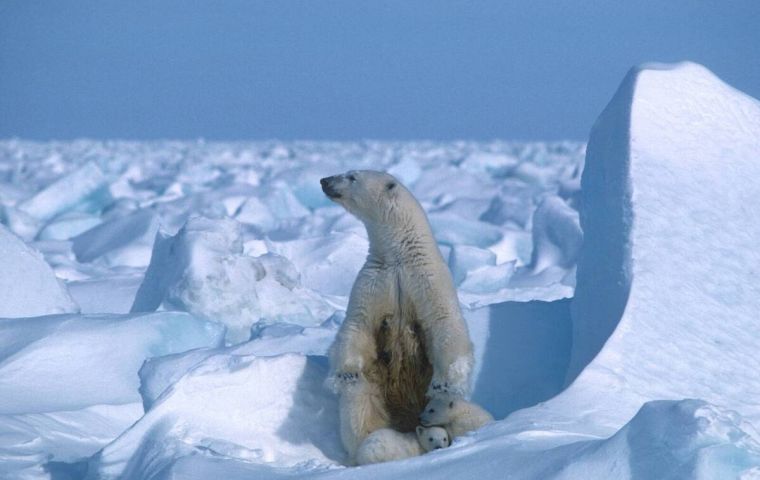MercoPress. South Atlantic News Agency
Climate change starving polar bears to extinction, according to latest report
 The threat is not rising temperatures per se but the top-of-the-food-chain predators' inability to adapt to a rapidly shifting environment.
The threat is not rising temperatures per se but the top-of-the-food-chain predators' inability to adapt to a rapidly shifting environment. Climate change is starving polar bears into extinction, according to research published on Monday that predicts the apex carnivores could all but disappear within the span of a human lifetime.
Climate change is starving polar bears into extinction, according to research published on Monday that predicts the apex carnivores could all but disappear within the span of a human lifetime.
In some regions they are already caught in a vicious downward spiral, with shrinking sea ice cutting short the time bears have for hunting seals, scientists reported in Nature Climate Change.
Their dwindling body weight undermines their chances of surviving Arctic winters without food, the scientists added.
“The bears face an ever longer fasting period before the ice refreezes and they can head back out to feed,” Steven Amstrup, who conceived the study and is chief scientist of Polar Bears International.
On current trends, the study concluded, polar bears in 12 of 13 subpopulations analyzed will have been decimated within 80 years by the galloping pace of change in the Arctic, which is warming twice as fast as the planet as a whole.
“By 2100, recruitment” - new births - “will be severely compromised or impossible everywhere except perhaps in the Queen Elizabeth Island subpopulation,” in Canada's Arctic Archipelago, said Amstrup.
That scenario foresees Earth's average surface temperature rising 3.3 degrees Celsius above the preindustrial benchmark.
One degree of warming so far has triggered a crescendo of heat-waves, droughts and super-storms made more destructive by rising seas.
But even if humanity were able to cap global warming at 2.4 degrees Celsius - about half-a-degree above Paris Agreement targets, but hugely ambitious all the same - it would probably only delay the polar bears' collapse.
“That is still way above anything polar bears have faced during one million years of evolutionary history,” said Amstrup.
The threat is not rising temperatures per se but the top-of-the-food-chain predators' inability to adapt to a rapidly shifting environment.
“If somehow, by magic, sea ice could be maintained even as temperatures increase, polar bears might be fine,” Amstrup said by email. “The problem is that their habitat is literally melting.”
“By estimating how thin and how fat polar bears can be, and modelling their energy use, we were able to calculate the threshold number of days that polar bears can fast before cub and adult survival rates begin to decline,” said lead author Peter Molnar, a professor at the University of Toronto.
A male bear, for example, in the West Hudson Bay population that is 20 per cent below its normal body weight when fasting begins will only have enough stored energy to survive about 125 days rather than 200 days.
New-born cubs are even more exposed, according to the study, especially when mothers have not fattened up enough to provide nourishing milk. Females without offspring, however, have the greatest capacity to withstand long periods without food.




Top Comments
Disclaimer & comment rulesCommenting for this story is now closed.
If you have a Facebook account, become a fan and comment on our Facebook Page!